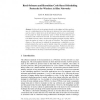Free Online Productivity Tools
i2Speak
i2Symbol
i2OCR
iTex2Img
iWeb2Print
iWeb2Shot
i2Type
iPdf2Split
iPdf2Merge
i2Bopomofo
i2Arabic
i2Style
i2Image
i2PDF
iLatex2Rtf
Sci2ools
ADHOCNOW
2005
Springer
2005
Springer
Reed-Solomon and Hermitian Code-Based Scheduling Protocols for Wireless Ad Hoc Networks
Abstract. In this work we investigate bounds on throughput and delay performance of a scheduling protocol that derives its decisions from codes traditionally used to correct or detect errors in the information carried over a noisy channel. In this paper we study the particular cases in which the Reed-Solomon and Hermitian code constructions are used. It is found that Hermitian codes outperform Reed-Solomon codes in minimum throughput guarantee and delay metrics when the number of nodes is in the order of thousands. The relative minimum distance of the code used to schedule the transmissions is identified as an important property that can be used to identify codes that can enable scheduling patterns with better minimum performance guarantees. Furthermore, the terminology of error control coding is used to present a more general and constructive framework for the study of code-based scheduling protocols.
ADHOCNOW 2005 | Hermitian Code Constructions | Hermitian Codes | Scheduling Protocols | Wireless Networks |
| Added | 26 Jun 2010 |
| Updated | 26 Jun 2010 |
| Type | Conference |
| Year | 2005 |
| Where | ADHOCNOW |
| Authors | Carlos H. Rentel, Thomas Kunz |
Comments (0)

